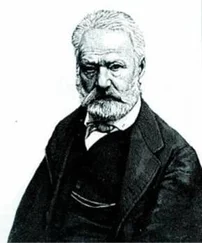Victor Hugo - Les Misérables, v. 3
Здесь есть возможность читать онлайн «Victor Hugo - Les Misérables, v. 3» — ознакомительный отрывок электронной книги совершенно бесплатно, а после прочтения отрывка купить полную версию. В некоторых случаях можно слушать аудио, скачать через торрент в формате fb2 и присутствует краткое содержание. Жанр: literature_19, foreign_antique, foreign_prose, на английском языке. Описание произведения, (предисловие) а так же отзывы посетителей доступны на портале библиотеки ЛибКат.
- Название:Les Misérables, v. 3
- Автор:
- Жанр:
- Год:неизвестен
- ISBN:нет данных
- Рейтинг книги:4 / 5. Голосов: 1
-
Избранное:Добавить в избранное
- Отзывы:
-
Ваша оценка:
- 80
- 1
- 2
- 3
- 4
- 5
Les Misérables, v. 3: краткое содержание, описание и аннотация
Предлагаем к чтению аннотацию, описание, краткое содержание или предисловие (зависит от того, что написал сам автор книги «Les Misérables, v. 3»). Если вы не нашли необходимую информацию о книге — напишите в комментариях, мы постараемся отыскать её.
Les Misérables, v. 3 — читать онлайн ознакомительный отрывок
Ниже представлен текст книги, разбитый по страницам. Система сохранения места последней прочитанной страницы, позволяет с удобством читать онлайн бесплатно книгу «Les Misérables, v. 3», без необходимости каждый раз заново искать на чём Вы остановились. Поставьте закладку, и сможете в любой момент перейти на страницу, на которой закончили чтение.
Интервал:
Закладка:
CHAPTER VI
MAGNON AND HER TWO LITTLE ONES
In Gillenormand sorrow was translated into choler; he was furious at being in despair. He had every prejudice and took every license. One of the things of which he composed his external relief and internal satisfaction was, as we have indicated, having remained a gay fellow, and passing energetically for such. He called this having a "royal renown," but this renown at times brought him into singular scrapes. One day a big baby, wrapped in rags and crying lustily, was brought to him in a basket, which a maid-servant, discharged six months previously, attributed to him. M. Gillenormand was at that time past his eighty-fourth year, and people around him became indignant and clamorous. "Does the impudent wench expect to make anybody believe this? What audacity! What an abominable calumny!" M. Gillenormand, however, did not feel at all angry. He looked at the brat with the amiable smile of a man flattered by the calumny, and said to the company, "Well, what is the matter? Is there anything so wonderful in it, that you should stand there like stuck pigs and display your ignorance? M. le Duc d'Angoulême, bastard of his Majesty Charles IX., married at the age of eighty-five a girl of fifteen; Monsieur Virginal, Marquis d'Alleuze, and brother of Cardinal de Sourdis, Archbishop of Bordeaux, had at the age of eighty-three by the lady's-maid of Madame Jacquin, the President's wife, a genuine love-child, who was a Knight of Malta, and Member of the Privy Council. One of the great men of this age, Abbé Tabaraud, is the son of a man of eighty-seven years of age. These things are common enough. And then take the Bible! After this, I declare that this little gentleman is none of mine; but take care of him, for it is not his fault." The creature, the aforesaid Magnon, sent him a second parcel the next year, also a boy, and M. Gillenormand thought it time to capitulate. He sent the two brats to their mother, agreeing to pay eighty francs a month for their support, but on condition that the mother was not to begin again. He added, "I expect that the mother will treat them well, and I shall go and see them now and then," which he did. He had a brother, a priest, who was for three-and-thirty years Rector of the Poitiers academy, and died at the age of seventy-nine. "I lost him when quite young," he would say. This brother, who is not much remembered, was a great miser, who, as he was a priest, thought himself bound to give alms to the poor he met, but he never gave them aught but bad or called-in money, thus finding means of going to Hades by the road to Paradise. As for M. Gillenormand the elder, he gave alms readily and handsomely; he was benevolent, brusque, and charitable, and had he been rich his downfall would have been magnificent. He liked everything that concerned him to be done grandly; even when he was swindled one day, having been plundered in the matter of an inheritance by a man of business in a clumsy and obvious manner, he made the solemn remark, "Sir, that was done very awkwardly, and I feel ashamed of such clumsiness. Everything has degenerated in this age, even the swindlers. Morbleu! a man of my stamp ought not to be robbed in that way; I was plundered as if I were in a wood, but badly plundered, sylvœ sint consule dignœ! " He had married twice, as we said; by his first wife he had a girl, who remained an old maid, and by the second another girl, who died at the age of thirty, and who married through love, or chance, or otherwise, a soldier of fortune who had served in the armies of the Republic and the Empire, won the cross at Austerlitz, and his colonel's commission at Waterloo. "He is the disgrace of my family," the old gentleman used to say. He took a great dial of snuff, and had a peculiarly graceful way of shaking his shirt-frill with the back of his hand. He believed very little in God.
CHAPTER VII
RULE: NO ONE RECEIVED UNTIL EVENING
Such was M. Luc Esprit Gillenormand, who had not lost his hair, which was rather gray than white, and always wore it in dog's ears, – altogether venerable. He was a man of the 18th century, frivolous and great. In 1814, and the early years of the Restoration, M. Gillenormand, who was still a youth, – he was only seventy-four, – resided in the Rue Sirvandoni, Faubourg St. Germain. He only retired to the Marais on leaving society, that is to say, long after his eightieth year, and on leaving the world he immured himself in his habits; the chief one, and in that he was invariable, was to keep his door closed by day and receive nobody, no matter the nature of his business, till night. He dined at five, and then his door was thrown open; it was the fashion of his century, and he did not like to give it up. "Day is low," he would say, "and only deserves closed shutters." People of fashion light up their wit when the zenith illumines its stars, and he barricaded himself against everybody, even had it been the King; such was old-time elegance.
CHAPTER VIII
TWO DO NOT MAKE A PAIR
As for M. Gillenormand's two daughters, they were born at an interval of ten years. In their youth they had been very little alike, and both in character and face were as little sisters as was possible. The younger was a charming creature, who turned to the light, loved flowers, poetry, and music, was enthusiastic, ethereal, and mentally betrothed from her youth up to some heroic figure. The elder had her chimera too; she saw in the azure an army-contractor, some fat and very rich man, a splendidly stupid husband, a million converted into a man, or else a prefect; the reception at the prefecture, an usher in the ante-room with a chain round his neck, the official balls, the addresses at the mansion-house to be "Madame la Prefête," – all this buzzed in her imagination. The two sisters wandered each in her own reverie, at the period when they were girls, and both had wings, – the one those of an angel, the other those of a goose.
No ambition is fully realized, at least not in this nether world, and no paradise becomes earthly in our age. The younger married the man of her dreams, but she was dead, while the elder did not marry. At the period when she enters into our narrative, she was an old virtue, an incombustible prude, with one of the most acute noses and most obtuse intellects imaginable. It is a characteristic fact that, beyond her family, no one had ever known her family name; she was called Mlle. Gillenormand the elder. In the matter of cant, Mlle. Gillenormand could have given points to a Miss. It was modesty pushed to the verge of the impure. She had one frightful reminiscence in her life, – one day a man saw her garter.
Age had only heightened this pitiless modesty, – her chemisette was never sufficiently opaque, and never was high enough. She multiplied brooches and pins at places where no one dreamed of looking. The peculiarity of prudery is to station the more sentries the less the fortress is menaced. Still, let who will explain these old mysteries of innocence, she allowed herself to be kissed without displeasure by an officer in the Lancers, who was her grand-nephew, and Théodule by name. In spite of this favored Lancer, however, the ticket of "Prude," which we have set upon her, suited her exactly. Mlle. Gillenormand's was a species of twilight soul, and prudery is a semi-virtue and a semi-vice. She added to prudery the congenial lining of bigotry; she belonged to the Sisterhood of the Virgin, wore a white veil on certain saints' days, muttered special orisons, revered "the holy blood," venerated "the sacred heart," remained for hours in contemplation before a rococo-Jesuit altar in a closed chapel, and allowed her soul to soar among the little marble clouds and through the large beams of gilt wood.
She had a chapel friend, an old maid like herself, of the name of Mlle. Vaubois, absolutely imbecile, and by whose side Mlle. Gillenormand had the pleasure of being an eagle. Beyond Agnus Deis and Ave Marias, Mlle. Vaubois knew nothing except the different ways of making preserves. Perfect of her kind, she was the ermine of stupidity, without a single spot of intelligence. We must add that Mlle. Gillenormand rather gained than lost by growing old. She had never been wicked, which is a relative goodness; and then years abrade angles, and time had softened her. She had an obscure melancholy, of which she did not herself possess the secret, and about her entire person there was the stupor of a finished life which has not begun. She kept house for her father; such families, consisting of an old man and an old maid, are not rare, and have the ever-touching appearance of two weaknesses supporting each other.
Читать дальшеИнтервал:
Закладка:
Похожие книги на «Les Misérables, v. 3»
Представляем Вашему вниманию похожие книги на «Les Misérables, v. 3» списком для выбора. Мы отобрали схожую по названию и смыслу литературу в надежде предоставить читателям больше вариантов отыскать новые, интересные, ещё непрочитанные произведения.
Обсуждение, отзывы о книге «Les Misérables, v. 3» и просто собственные мнения читателей. Оставьте ваши комментарии, напишите, что Вы думаете о произведении, его смысле или главных героях. Укажите что конкретно понравилось, а что нет, и почему Вы так считаете.












